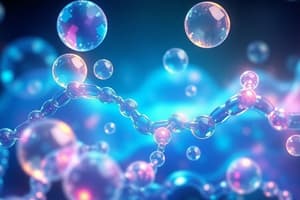Podcast
Questions and Answers
What is the primary reason why it is impossible to select a single organic solvent to extract all types of lipids?
What is the primary reason why it is impossible to select a single organic solvent to extract all types of lipids?
- Different lipids have different polarities (correct)
- Different lipids have different boiling points
- Solvents are always expensive and toxic
- Lipids are always non-toxic and non-flammable
What is a desirable property of a solvent for lipid extraction?
What is a desirable property of a solvent for lipid extraction?
- Toxicity
- High boiling point
- Low boiling point and non-toxicity (correct)
- Flammability
What is an advantage of using CO2 in supercritical fluid extraction?
What is an advantage of using CO2 in supercritical fluid extraction?
- It is expensive and non-recyclable
- It has a mild critical temperature and is recyclable (correct)
- It has a high critical temperature
- It is environmentally harmful
What is an advantage of Soxhlet extraction?
What is an advantage of Soxhlet extraction?
What is a characteristic of ethyl ether and petroleum ether?
What is a characteristic of ethyl ether and petroleum ether?
What percentage of fatty acids found in plants and animals are esterified to glycerol?
What percentage of fatty acids found in plants and animals are esterified to glycerol?
Which of the following types of lipids are considered to be polar lipids?
Which of the following types of lipids are considered to be polar lipids?
Why is it often necessary to dry samples prior to solvent extraction?
Why is it often necessary to dry samples prior to solvent extraction?
What is the purpose of acid hydrolysis in sample preparation?
What is the purpose of acid hydrolysis in sample preparation?
What is the ideal characteristic of a solvent for lipid extraction?
What is the ideal characteristic of a solvent for lipid extraction?
Flashcards are hidden until you start studying
Study Notes
Classes of Lipids
- Over 99% of fatty acids in plants and animals are esterified to glycerol, forming simple lipids
- Derived lipids include compounds such as phospholipids and glycolipids
- Phospholipids and glycolipids are considered polar lipids, while simple and derived lipids are non-polar
Sample Preparation
- Drying samples is necessary prior to solvent extraction, as many organic solvents cannot penetrate foods containing water
- Particle size reduction is performed to produce a homogeneous sample and increase the surface area of lipid exposed to the solvent
- Acid hydrolysis is used to break bonds holding lipids and non-lipid components together, releasing bound lipids into extractable forms
Solvent Selection
- The ideal solvent for lipid extraction would completely extract all lipid components while leaving other components behind
- Solvent selection depends on the polarity of the lipids present compared to the polarity of the solvent
- Polar lipids (e.g. glycolipids, phospholipids) are more soluble in polar solvents (e.g. alcohols), while non-polar lipids (e.g. triacylglycerols) are more soluble in non-polar solvents (e.g. hexane)
- It is impossible to select a single organic solvent to extract all lipids, and mixtures of solvents may be used
- Desirable solvent properties include being inexpensive, having a low boiling point, and being non-toxic and non-flammable
Solvent Extraction Methods
- Soxhlet extraction is advantageous for foods containing small amounts of lipids, and allows for solvent reuse
- Supercritical fluid extraction using CO2 has the advantages of mild temperature, easy recyclability, and environmental friendliness
Studying That Suits You
Use AI to generate personalized quizzes and flashcards to suit your learning preferences.





